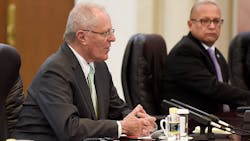Pacific Leaders Urged to Defend Free Trade after Trump Win
LIMA, Peru—Asia-Pacific leaders were urged Friday to defend free trade from rising protectionism after the election victory of Donald Trump stoked fears that years of tearing down barriers to global commerce could be reversed.
Trump, who triumphed in last week's U.S. presidential vote, successfully tapped the anger of working-class voters who feel left behind by globalization, vowing to protect American jobs against cheap labor in countries like China and Mexico.
The brash billionaire notably vowed to scuttle U.S. President Barack Obama's key trade initiative in the Asia-Pacific, the Trans-Pacific Partnership (TPP), leaving a vacuum that China--which was excluded from the deal--is keen to fill.
As a summit of the 21-member Asia-Pacific Economic Cooperation (APEC) group got under way, host President Pedro Pablo Kuczynski of Peru urged the region's leaders to robustly defend free trade, while the U.S. sought to reassure worried allies.
"In the U.S. and Britain, protectionist tendencies are taking over," Kuczynski told APEC leaders.
"It is fundamental that world trade grow again and that protectionism be defeated."
Trump's victory came after Britain's surprise "Brexit" vote in June to leave the European Union, adding to deep uncertainty about the post-war world order and the future of free trade.
A delegate at ministerial meetings held on Thursday and Friday said APEC ministers had expressed concern over growing protectionism in the United States, and that the mood had been somber.
The official, who asked not to be named, said US Trade Representative Michael Froman had sought to assure ministers that American core interests don't change from administration to administration.
The US president-elect is not at the summit but he looms large over the meeting of APEC, a free-trade club founded in 1989 that represents nearly 40% of the world's population and nearly 60% of the global economy.
'Unequivocal Message'
In a clear jab at the mogul's anti-trade stance, Kuczynski said that "anyone who wants to promote protectionism (should) read an economic history of the 1930s."
He conceded that the summit's planned agenda--a focus on "growth with fair employment"--had been hijacked by the recent votes and urged the leaders in Lima to react forcefully.
"We have to deliver an unequivocal message to the world that trade continues to be beneficial," he said.
The U.S. election has left China, a country the United States once considered a threat to free-market capitalism, as the unlikely leader of the movement for open trade.
Chinese President Xi Jinping is holding a strong hand as he meets Obama and other APEC leaders this week.
"There is no doubt that if the TPP fails it will be a huge win for China, politically and economically," said Brian Jackson, a China economist at consultancy IHS Global Insight.
"On the political side, TPP negotiations took years and plenty of political capital in partner countries. So its failure would create a credibility gap," he told AFP.
"Economically ... it will provide China with a stronger negotiating position as one major alternative source of demand."
Even longtime U.S. allies in the Asia-Pacific region now say they are keen to get on board with Chinese-backed alternatives to TPP.
Australia's trade minister told the Financial Times Wednesday his country backs "any move that reduces barriers to trade and helps ... drive economic growth."
Beijing is pushing an APEC-wide Free Trade Area of the Asia-Pacific (FTAAP) and a 16-member Regional Comprehensive Economic Partnership (RCEP), which includes India but not the United States.
Economists warn Trump's policies, if they follow through on his campaign pledges, would unleash chaos on the highly interconnected world economy.
A protectionist turn for the U.S. would cause "huge adjustment difficulties for countries that have grown through trade," said Robert Lawrence, a trade expert at Harvard University.
"It's going to be hugely disruptive for the world. And I don't think that the trade part of his program is going to do much for the American workers who he claims to want to help."
Copyright Agence France-Presse, 2016
About the Author
Agence France-Presse
Copyright Agence France-Presse, 2002-2025. AFP text, photos, graphics and logos shall not be reproduced, published, broadcast, rewritten for broadcast or publication or redistributed directly or indirectly in any medium. AFP shall not be held liable for any delays, inaccuracies, errors or omissions in any AFP content, or for any actions taken in consequence.
